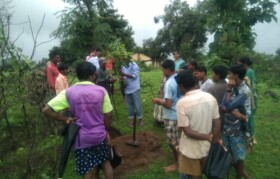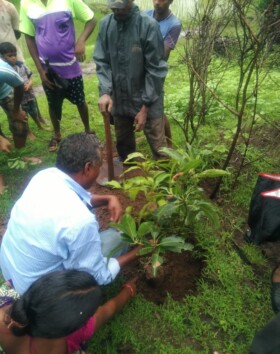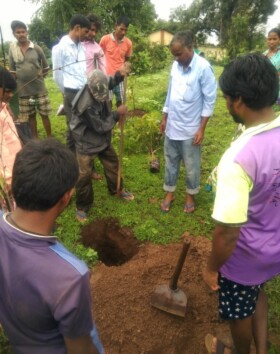Mango Saplings to Nandelpada

This post has already been read 854 times!
Most of the tribals in the Vikramgad area follow the same pattern to earn their livelihood. They grow rice during the rainy season, preserve most of it for themselves, sell remaining small portion for immediate cash and move out of villages for next 6 to 7 months for odd jobs such as working at brick kiln, construction sites, fishing or sand mining. In period starting from Nov/Dec till next monsoon, they are mostly out, visit only occasionally on certain festivals. Females have to manage their homes in the absence of male members. In certain cases, if they have to earn more money for important occasions viz the marriage of the daughter or son, both the parents leave home for 6 to 7 months leaving the kids at the mercy of elders at home or even neighbors. They are not very happy with this model but they don’t have much options of earning livelihood closer to their home.
During our meeting with Nandelpada villagers in the last academic year, the same sentiments were echoed by the villagers. They were looking for some options, wherein they can spend more time closer to their home. In the earlier discussions, we had given them ideas, which they could not directly relate. Hence, we decided to share the success story of the people from Dharampur, who were in the similar situation a decade back, but live a very comfortable life now.
Dharampur, situated at hilly area in Gujarat near at Maharashtra border. It gets only 40’’ of water per year as compared to Mumbai, which gets 100’’ per year. There was no ground water available after December in the early days, which did not allow tribals to take multiple crops in the year. Some knowledgeable people from Mumbai identified inability to stop and preserve the water was the main reason for unavailability of the water after December. They built hundreds of check dams and could see the rise in water level within a year or two. They have availability of water for farming throughout the year. They take multiple crops in a year. Once ensuring their own comfort in the changed scenario, the started expanding further. Villagers grow mango in their area, let the sapling take a nice shape (to ensure its survival in any condition) and then sell to the other villages, who in took care of the mango trees and reaped the benefit by selling the mangoes subsequently. Since Nandelpada village does not have any water problem, we did not have to look at building the check dam. Hence, we checked with them whether they would like to get the saplings and guidance to grow the same from their Dharampur counterpart. The response was extremely positive.
Team Suhrid coordinated with Santu bhai (Known as son of the hills and valleys) from Dharampur, who delivered 200 odd saplings to Nandelpada. Apart from delivering the same, he taught them the complete process of preserving and growing the tree. It may take another 2 to 3 years for those trees to bear the saleable fruits. However, it has given a new hope to the villagers now.
We would be working closely with them to help them stay as close to their own villages, which in turn would result in proper care of the family (especially the children). On 17th Jul, Suhrid volunteers helped handover these saplings to villagers and also help demonstrate how to plant the saplings and take good care of it, through expert Santu bhai from Dharampur.
Picture Gallery






